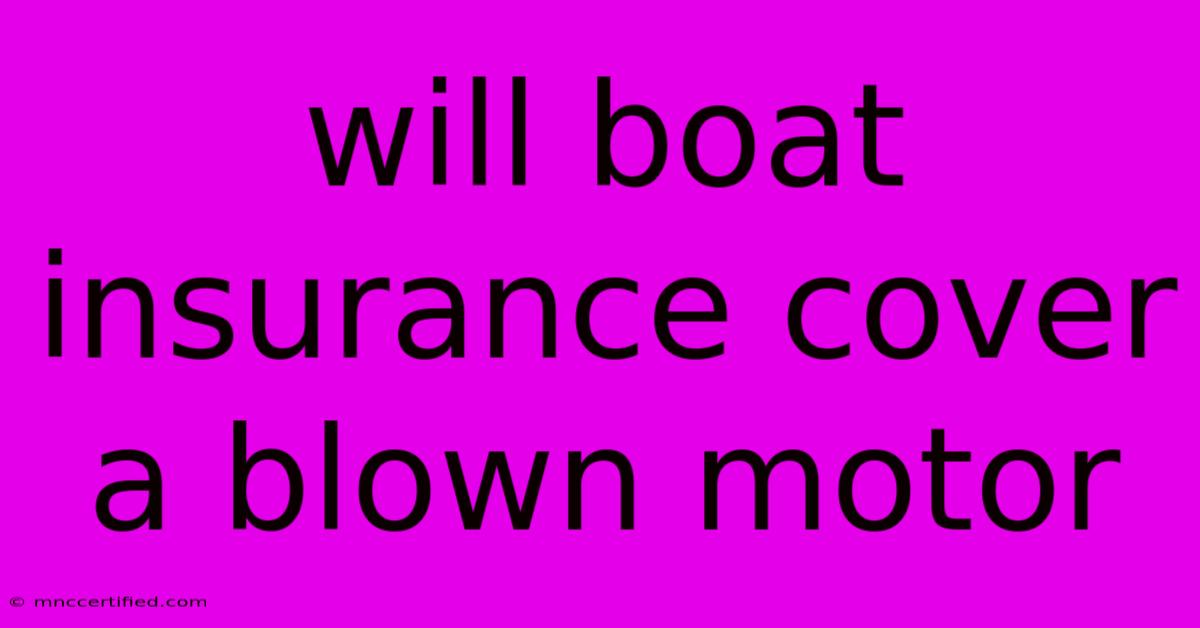Will Boat Insurance Cover A Blown Motor

Table of Contents
Will Boat Insurance Cover a Blown Motor?
The dreaded "clunk" and the sudden loss of power – a blown motor is a nightmare scenario for any boat owner. But when it happens, one of the first questions that pops into your mind is: Will my boat insurance cover it?
The short answer is: It depends. Boat insurance policies vary greatly, so you need to carefully examine your specific coverage. Here's a breakdown of what you need to know:
Understanding Your Boat Insurance Policy
The key to understanding whether your boat insurance will cover a blown motor lies in your policy's "perils covered" section. This section outlines the specific events or incidents that your policy will cover.
Here are some common perils that may be covered:
- Hull damage: This typically covers physical damage to your boat's structure, including the engine. However, it's crucial to note that wear and tear are usually not covered.
- Mechanical breakdown: Some policies offer specific coverage for mechanical breakdowns. However, this often has limitations, such as age limits on the engine or exclusions for pre-existing conditions.
- Collision: If another vessel collides with your boat and causes engine damage, your policy may cover the repairs.
Factors Affecting Coverage
Several factors influence whether your boat insurance will cover a blown motor:
- Age of the engine: Policies often have age limits for engine coverage. Older engines might not be fully covered or may require additional endorsements.
- Maintenance records: Proof of regular engine maintenance can strengthen your claim.
- Cause of the breakdown: Sudden and unexpected breakdowns are more likely to be covered than gradual wear and tear or neglect.
- Policy exclusions: Always review your policy's exclusions carefully. Common exclusions include pre-existing conditions, lack of proper maintenance, or damage caused by negligence.
What to Do if Your Engine Blows
If your boat engine blows, follow these steps:
- Ensure safety: Prioritize the safety of yourself and your passengers.
- Contact the Coast Guard: Report the incident to the Coast Guard for assistance.
- Document the incident: Take photos and videos of the damage, and gather any witness statements.
- Contact your insurance company: Report the incident immediately and follow their instructions.
- Seek professional repairs: Do not attempt to repair the engine yourself unless you are a qualified mechanic.
Preventing Engine Problems
The best way to avoid a blown motor is through regular maintenance. Here are some essential steps:
- Follow the manufacturer's maintenance schedule: Refer to your owner's manual for recommended service intervals.
- Regularly inspect engine fluids: Check oil, coolant, and transmission fluid levels.
- Replace filters: Change air, oil, and fuel filters according to the manufacturer's recommendations.
- Keep the engine clean: Regularly clean the engine compartment to prevent corrosion and debris buildup.
- Use high-quality fuel: Avoid using lower-grade fuels, as they can damage the engine.
Final Thoughts
While a blown motor is a frustrating and expensive situation, understanding your boat insurance policy can help you navigate the process. Remember to review your policy carefully, keep your engine well-maintained, and contact your insurance company immediately if an incident occurs. By taking these precautions, you can minimize the financial impact of an engine failure and get back on the water sooner.

Thank you for visiting our website wich cover about Will Boat Insurance Cover A Blown Motor. We hope the information provided has been useful to you. Feel free to contact us if you have any questions or need further assistance. See you next time and dont miss to bookmark.
Featured Posts
-
Commercial Real Estate Investing Books
Nov 09, 2024
-
Hk Welcomes Two Debutants Ahead Of Brazil Clash
Nov 09, 2024
-
Property And Casualty Insurance Course
Nov 09, 2024
-
Redwood Fire And Casualty Insurance Co
Nov 09, 2024
-
Pompeii Victims Dna Reveals New Truths
Nov 09, 2024